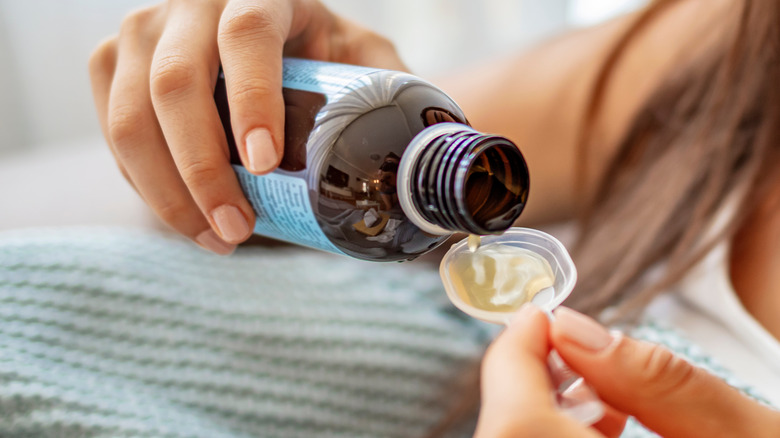Why It's A Big Mistake To Take Cough Syrup Right Before Bed
Like many of us, when you feel the seasonal sniffles or a hacking cough coming on, you probably head straight to the drugstore for quick relief in the form of cough syrup. While different cough syrups will contain different ingredients, you can often find dextromethorphan (DXM) and guaifenesin in many over-the-counter brands approved for those over the age of 12 (via Drugs.com). It's these ingredients that give cough syrup its cough-suppressant and phlegm-clearing abilities. While this may help some individuals sleep more soundly at night while sick, taking cough syrup right before you climb into bed may be doing damage to your teeth, according to experts at Rochester Dental Office.
Compared to waking hours, your body produces far less saliva as we sleep. Not only does saliva help rinse debris and bacteria from your mouth, but it also minimizes your teeth's exposure to decay-causing ingredients that you eat throughout the day. Unfortunately, some of these enamel-damaging ingredients can be found in cough syrup. With less saliva being produced to wash these contaminants away as you snooze, your teeth are exposed to these ingredients for longer stretches of time. In cough syrup, the main culprits are sugar and alcohol.
Your teeth will have prolonged exposure to damaging ingredients
Cough syrup isn't exactly tasty to begin with, and it would be even worse without its sugar ingredients to help mask the taste. While this helps make cough syrup more tolerable to swallow, the main cause of tooth decay can be traced to sugar intake. According to experts at Rochester Dental Office, the combination of sugar and natural bacteria in your mouth becomes acid. This acid harms the protective enamel of your teeth and contributes to tooth decay. When taking cough syrup right before bed, this acid sits on your teeth throughout the course of the night.
In addition, the alcohol in cough syrup can dry out your mouth, posing another risk factor for tooth decay. Some cough syrup products also contain citric acid and antihistamines (via Smilepoint Dental). While citric acid does give you a dose of vitamin C, both compounds can contribute to enamel erosion.
Take cough syrup at this time of day instead
To minimize the potential risks to your oral health, experts suggest taking cough syrup at mealtime, when saliva production is still strong (via Smilepoint Dental). Additionally, rinse your mouth out with water and brush your teeth with a fluoride-containing toothpaste after taking cough syrup to help keep teeth protected. Switching up the type of cough medicine you're taking can also be beneficial for your dental health. Rather, opt for a sugar-free cough syrup or take cough medicine as a pill instead.
Alternatively, it may be worth moving away from cough syrup altogether. According to a video produced by The American Chemical Society, studies show mixed results when it comes to the efficacy of cough syrup in relieving cough, with some research showing it to have no effect whatsoever. While the medicine may help put you to sleep, the organization instead pointed to alternate treatment methods, such as keeping up one's fluid intake, using a humidifier, taking a hot shower, or drinking tea with lemon, all of which may provide more satisfying relief.


